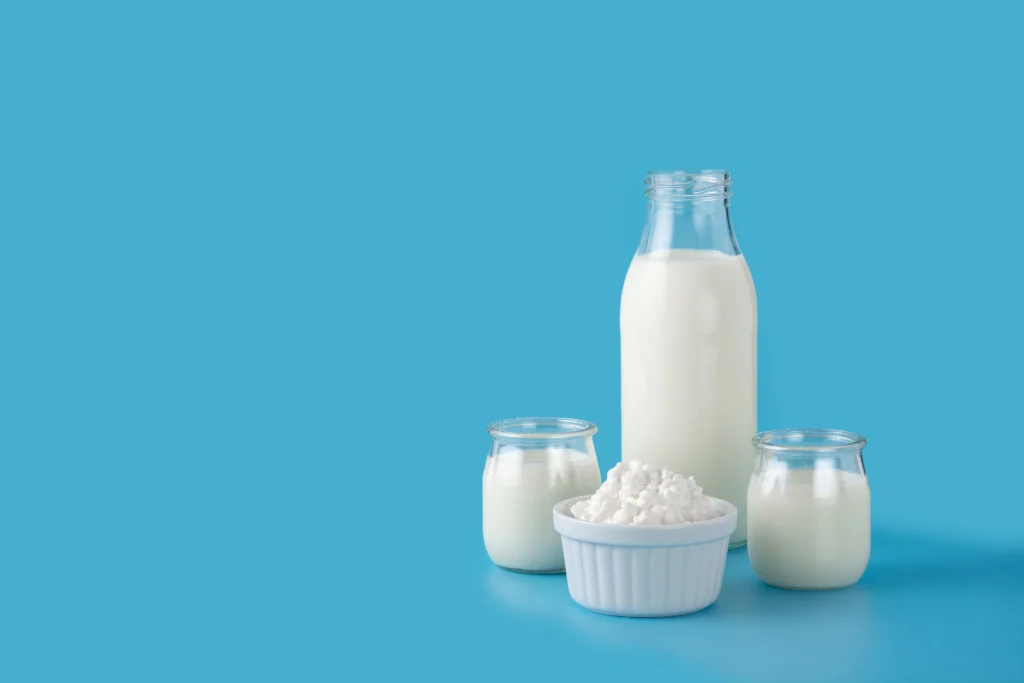Probiotics are live microorganisms that provide health benefits when consumed in adequate amounts. They are found in many fermented foods and supplements, and they can help maintain a healthy balance of bacteria in your gut microbiome. But with so many different strains of probiotics available, it can be overwhelming to know which one to choose.
Different Strains of Probiotics
It’s important to note that not all probiotic strains are created equal, and different strains can have different health benefits. When choosing a probiotic supplement, look for one that contains the specific strains that have been studied for their health benefits. You can also talk to a healthcare professional for recommendations on which strains may be best for your individual health needs. Some common strains include:
Lactobacillus
Lactobacillus is a genus of Gram-positive bacteria that is commonly found in the human gut, mouth, and vagina. It is the most common type of probiotic and is also found in many fermented foods such as yogurt, kefir, and sauerkraut.
Lactobacillus strains can provide a range of health benefits. One of the primary benefits of Lactobacillus is its ability to improve digestion and nutrient absorption. It does this by producing enzymes that help break down complex carbohydrates, such as lactose in milk, into simpler forms that the body can easily absorb. This can be especially beneficial for people who are lactose intolerant.
In addition to its digestive benefits, Lactobacillus can also help boost the immune system. It does this by stimulating the production of natural killer cells, which are white blood cells that help fight off infections and diseases.
Some strains of Lactobacillus have also been studied for their ability to alleviate symptoms of irritable bowel syndrome (IBS). For example, Lactobacillus acidophilus has been shown to reduce bloating, gas, and constipation in people with IBS.
Another potential benefit of Lactobacillus is its ability to help prevent and treat vaginal infections. Lactobacillus produces lactic acid, which helps create an acidic environment in the vagina that is inhospitable to harmful bacteria.
It’s important to note that not all Lactobacillus strains provide the same health benefits. Different strains can have different effects on the body, and more research is needed to fully understand their individual health benefits.

Bifidobacterium
Bifidobacterium is a genus of Gram-positive bacteria that is commonly found in the human gut. It is one of the most important types of probiotics and is also found in many fermented foods such as kefir and kombucha.
Bifidobacterium strains can provide a range of health benefits. One of the primary benefits of Bifidobacterium is its ability to break down complex carbohydrates, such as fiber, that the body cannot digest. This can help improve digestive health and reduce symptoms of digestive disorders like constipation, diarrhea, and irritable bowel syndrome (IBS).
In addition to its digestive benefits, Bifidobacterium can also help boost the immune system. It does this by stimulating the production of immune cells such as natural killer cells, which help fight off infections and diseases.
Bifidobacterium also helps prevent harmful bacteria from growing in the gut by creating an environment that is unfavorable to their growth. This can help prevent infections and diseases, especially those related to the digestive system.
Some strains of Bifidobacterium have also been studied for their ability to reduce inflammation in the body. Inflammation is a natural response to injury or infection, but chronic inflammation can lead to a range of health problems, including heart disease, diabetes, and cancer.
It can also play a role in maintaining a healthy weight. Studies have shown that obese people have lower levels of Bifidobacterium in their gut than healthy weight individuals. By improving digestion and reducing inflammation, Bifidobacterium can help promote a healthy weight.
Streptococcus
Streptococcus is a genus of Gram-positive bacteria that can cause a range of infections in humans. Some strains of Streptococcus are pathogenic and can cause serious illnesses such as strep throat, pneumonia, meningitis, and sepsis.
However, there are also non-pathogenic strains of Streptococcus that are considered probiotics and can provide health benefits. One of the most well-known probiotic strains of Streptococcus is Streptococcus thermophilus, which is commonly found in fermented dairy products such as yogurt and cheese.
Streptococcus thermophilus can help improve digestion and nutrient absorption, particularly for lactose in dairy products. It does this by producing the enzyme lactase, which breaks down lactose into simpler forms that the body can easily absorb. This can be especially beneficial for people who are lactose intolerant.
In addition to its digestive benefits, Streptococcus thermophilus can also help boost the immune system. It does this by stimulating the production of immune cells such as natural killer cells and T cells, which help fight off infections and diseases.
Some studies have also suggested that Streptococcus thermophilus may help reduce inflammation in the body. Chronic inflammation has been linked to a range of health problems, including heart disease, diabetes, and cancer.
Saccharomyces
Saccharomyces boulardii is a type of yeast that is considered a probiotic. It is not a natural inhabitant of the human gut, but it can be found in some fermented foods and supplements.
Saccharomyces boulardii has been shown to provide a range of health benefits. One of its primary benefits is its ability to prevent and treat gastrointestinal infections, including those caused by bacteria, viruses, and parasites. It does this by producing compounds that can kill harmful bacteria and by competing with harmful bacteria for nutrients and space in the gut.
Saccharomyces boulardii can also help improve digestive health by balancing the gut microbiome. It can help regulate the levels of beneficial bacteria in the gut, which can improve digestion and nutrient absorption. This can be especially beneficial for people with digestive disorders such as inflammatory bowel disease (IBD) or irritable bowel syndrome (IBS).
In addition to its digestive benefits, Saccharomyces boulardii can also help boost the immune system. It does this by stimulating the production of immune cells such as natural killer cells and T cells, which help fight off infections and diseases. Some studies have also suggested that Saccharomyces boulardii may have anti-inflammatory properties and can help reduce inflammation in the gut.

Escherichia coli (E. coli)
Escherichia coli (E. coli) is a type of bacteria that is commonly found in the human gut. While some strains of E. coli are harmless and even beneficial to the human body, others can cause serious illnesses and infections.
Pathogenic strains of E. coli can cause food poisoning and urinary tract infections (UTIs). In severe cases, they can cause life-threatening conditions such as hemolytic uremic syndrome (HUS), which can lead to kidney failure and even death.
However, not all strains of E. coli are harmful. In fact, some strains are considered probiotics and can provide health benefits. One of the most well-known probiotic strains of E. coli is Escherichia coli Nissle 1917 (ECN 1917).
ECN 1917 can help improve digestive health by producing substances that can protect the gut from harmful bacteria and reduce inflammation. It can also help balance the gut microbiome by stimulating the growth of beneficial bacteria and suppressing the growth of harmful bacteria.
ECN 1917 has been shown to be effective in treating a range of digestive disorders, including irritable bowel syndrome (IBS), inflammatory bowel disease (IBD), and antibiotic-associated diarrhea.
Bacillus Coagulans
Bacillus coagulans is a type of bacteria that is commonly used as a probiotic. It is known for its ability to survive harsh conditions, such as high temperatures and acidic environments, which allows it to reach the gut intact.
Bacillus coagulans is a spore-forming bacterium, which means it can form a protective spore around itself that can survive extreme conditions, such as heat, cold, and harsh chemicals. This spore protects the bacteria as it passes through the stomach acid and into the intestines, where it can then colonize the gut and provide health benefits.
One of the primary health benefits of Bacillus coagulans is its ability to improve digestive health. It can help balance the gut microbiome by stimulating the growth of beneficial bacteria and suppressing the growth of harmful bacteria. This can help improve digestion, nutrient absorption, and overall gut health.
Bacillus coagulans has also been shown to have immune-boosting properties. It can stimulate the production of immune cells, such as T cells and natural killer cells, which can help fight off infections and diseases.
In addition to its digestive and immune-boosting benefits, Bacillus coagulans has been shown to have anti-inflammatory properties. It can help reduce inflammation in the gut and other parts of the body, which can be beneficial for people with inflammatory conditions, such as rheumatoid arthritis and inflammatory bowel disease (IBD).
Bacillus coagulans is commonly found in probiotic supplements and some fermented foods, such as yogurt and kefir. It is generally considered safe for most people, but it’s important to choose a high-quality supplement and to talk to your healthcare provider before starting any new supplements. They can help you choose the right supplement and dosage based on your individual health needs.
FINAL THOUGHTS
Probiotics are live microorganisms that can provide health benefits when consumed in adequate amounts. There are many different strains of probiotics, each with their unique health benefits. Lactobacillus, Bifidobacterium, and Streptococcus are some of the most common probiotic strains. However, other strains, such as Saccharomyces boulardii and Escherichia coli Nissle 1917, can also provide significant health benefits.
Probiotics can improve digestive health, boost the immune system, and have anti-inflammatory properties. They can also help balance the gut microbiome by promoting the growth of beneficial bacteria and suppressing the growth of harmful bacteria.
It’s important to choose high-quality probiotic supplements and to talk to a healthcare provider before starting any new supplements. They can help determine the right probiotic strain and dosage for your individual health needs.
In conclusion, incorporating probiotics into your diet can provide a range of health benefits and support overall health and well-being.